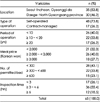Abstract
Purpose
This study was conducted to examine prerequisite-program performance of the hospital foodservice operation and develop measures for improvement of prerequisite-program performance.
Methods
Data were collected through surveys administered to 168 hospital dieticians in the Seoul, Incheon, Gyeonggi-do, Daegu, and North Gyeongsang areas. Out of total questionnaires, 65 questionnaires were usable and the response rate was 38.7%. Statistical analyses were performed using the SPSS program (ver 20.0) for χ2-test and one-way ANOVA.
Results
According to the result of the prerequisite-program evaluation, the percentage of 'appropriate', 'needs to be improved', and 'inappropriate' was 44.6%, 47.7%, and 7.7%, respectively. The score for the 'inappropriate' group was significantly lower than that of the 'appropriate' group or 'needs to be improved' group on the food safety management (p < 0.001), preparation facility management (p < 0.001), water management (p < 0.001), and storage·transportation management (p < 0.05) parts. Holding rate of foodservice facility and equipments in the 'appropriate' group were significantly higher than in the others on convection oven (p < 0.01), air conditioner (p < 0.01), three-compartment sink (p < 0.01), hot-holding equipment (p < 0.01), cold-holding equipment (p < 0.05), exclusive thawing refrigerator (p < 0.05), and sterilizer for sanitary shoes (p < 0.05) items.
Figures and Tables
Table 3
Comparison of performance scores according to evaluation level of prerequisite program appling to hospital foodservice operations

1) 'Appropriate' group's evaluation score: ≥ 85 /100 points 2) Mean (SD) of management part, subtotal of each part: Facility (25 points), Food safety (39 points), Preparation (5 points), Refrigeration· Freezing (2 points), Water (9 points), Storage· Transportation (13 points), Inspection (1 point). 3) a,b,c Different letters mean significant difference between groups by Duncan's multiple range test. 4) 'Needs to be improved' group's evaluation score: ≤ 84 ~ ≥ 71 /100 points 5) 'Inappropriate' group's evaluation score: ≤ 70 /100 points
*p < 0.05, ***p < 0.001
Table 4
Relationship between evaluation level of prerequisite program and characteristics of hospital foodservice operations

Table 5
Relationship between evaluation level of prerequisite program and characteristics of the dietitians

References
1. Lee SJ. Analysis of the Effect of Dietitians' Work Behavior and Organizational Environment on Quality of Hospital Dietary Services. Korean J Nutr. 2005; 38(9):756–764.
2. Bae HJ, Lee HY, Chun HJ. An assessment of dietitian job tasks according to the characteristics of foodservice operations and dieticians. Korean J Food Cookery Sci. 2007; 23(6):858–866.
3. Korea Institute for Healthcare Accreditation. Accreditation standards for healthcare organizations [Internet]. Seoul: Korea Institute for Healthcare Accreditation;2011. cited 2015 Dec 28. Available from: http://www.koiha.or.kr/home/data/data/doList.act?boardtype=05.
4. Nam EJ, Lee YK. Evaluation of sanitary management based on HACCP of business and industry foodservice operations in Taegu and Kyungpook areas. J Korean Diet Assoc. 2001; 7(1):28–37.
5. Lee JS, Kwak TK, Kang YJ. Development of the hospital foodservice facility evaluation tools based on the general HACCP-based sanitation standards and guidelines. Korean J Soc Food Cookery Sci. 2003; 19(3):339–353.
6. Lee JS, Kwak TK, Kang YJ. Development of a hospital foodservice facility plan and model based on general sanitation standards and HACCP guidelines. Korean J Soc Food Cookery Sci. 2003; 19(4):477–492.
7. Hong WS, Yoon JY. Foodservice employees' sanitation and hygiene practice in school foodservice. Korean J Soc Food Cookery Sci. 2003; 19(4):403–412.
8. Kim SO, Oh MS. Sanitary management performance and knowledge of employees in hospital food service. J Korean Home Econ Assoc. 2005; 43(11):127–140.
9. Korea Institute Food Safety Management Accreditation. Implementation practices of HACCP [Internet]. Daejeon: Korea Institute Food Safety Management Accreditation;2015. Dec. 31. cited 2016 Jan 9. Available from: http://www.haccpkorea.or.kr/info/info_06.do?menu=M_02_01_06.
10. Kim MY, Kim KJ, Lee KE. In-patients' food consumption and perception on foodservice quality at hospitals. J Korean Diet Assoc. 2008; 14(1):87–96.
11. Gam SO, Park JR, Kim MJ, Lee MK, Shin KH. The evaluation of hospital foodservice with patients' condition. J Korean Diet Assoc. 2007; 13(2):101–113.
12. Bae HJ, Paik JE, Joo NM, Youn JY. HACCP principles and applications for foodservice manager. Paju: Kyomunsa;2012.
13. Kim JW, Kim DY, Kwak TK, Suh HJ. Hygienic status of Korean hospital foodservice. Korean J Soc Food Cookery Sci. 2001; 17(2):105–116.
14. Bae HJ. Evaluation of dietitians' perception of importance about HACCP guidelines in foodservice facilities. J Korean Diet Assoc. 2005; 11(1):105–113.
15. Bae HJ. Evaluation of dietitians' perception of importance about prerequisite program in foodservice facilities. J Korean Diet Assoc. 2005; 11(2):233–241.
16. Song YJ, Bae HJ. Importance-performance analysis about sanitation management items at general hospital foodservice operations. Korean J Food Cookery Sci. 2013; 29(1):63–71.

17. Korean Hospital Association. Hospital list [Internet]. Seoul: Korean Hospital Association;2012. cited 2015 Dec 28. Available from: http://www.hospitalmaps.or.kr/hm/frHospital/hospital_list_state.jsp?s_mid=020100.
18. Korea Institute Food Safety Management Accreditation. Hazard analysis and critical control point [Internet]. Daejeon: Korea Institute Food Safety Management Accreditation;2014. Dec. 1. cited 2015 Dec 28. Available from: http://www.haccpkorea.or.kr/info/info_04.do?menu=M_02_01_04.
19. Park JH. Assessment of HACCP pre-requisite management practices for school food service in Daegu and Gyeongbuk area [dissertation]. Gyeongsan: Yeungnam University;2011.
20. Kim JH. A study on the current conditions of HACCP-designated food service [dissertation]. Daejeon: Chungnam National University;2011.
21. Bae HJ, Jeon EK, Lee HY. Analyzing the importance and performance of sanitation management within foodservice facilities and utilities. Korean J Food Cookery Sci. 2008; 24(3):325–332.
22. Longrée K, Armbruster G. Quantity food sanitation. 5th edition. New York (NY): Wiley;1996.




 PDF
PDF ePub
ePub Citation
Citation Print
Print





 XML Download
XML Download